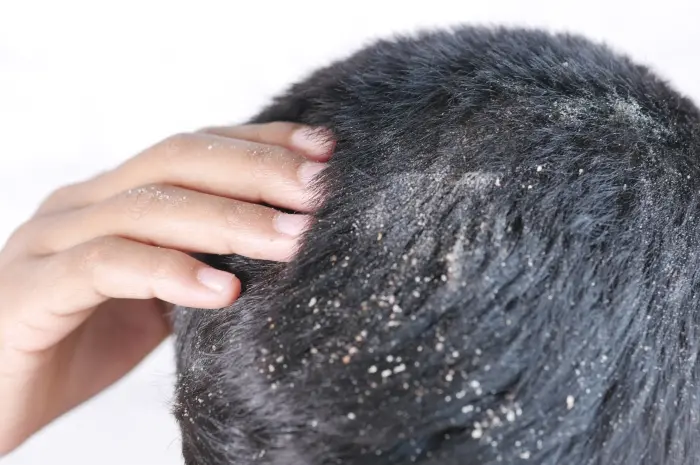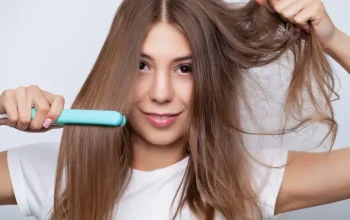Discover the best ways to treat dry dandruff with natural treatments, using the right products, and scalp care tips to keep it healthy and flake-free.
Dry dandruff is a common problem that often interferes with appearance, especially because of the white flakes that often appear on the hair or shoulders. Although this condition is not dangerous, dry dandruff can reduce self-confidence and increase discomfort.
Dry dandruff is usually caused by a scalp that has lost moisture, irritation from using inappropriate skincare products, or environmental factors such as dry weather.
This article will discuss effective ways to treat dry dandruff, including natural treatments, using the right products, and lifestyle changes that can help restore your scalp’s health.
What Is Dry Dandruff?
Dry dandruff is a condition where the scalp flakes and produces small flakes that look like scales. Dandruff is generally caused by the scalp losing its natural moisture, making it dry and flaky.
Unlike oily dandruff, which is caused by excess oil production on the scalp, dry dandruff is more related to dryness on the scalp, causing dead skin cells to flake off.
Understanding How to Get Rid of Dandruff is essential, as this condition can affect anyone but is more common in winter or when humidity is low.
Causes of Dry Dandruff
There are various factors that can cause dry dandruff, including:
1. Dry and Cold Weather
Cold weather with low humidity levels can dry out the scalp, triggering shedding of skin cells, and causing dry dandruff. Winter or dry environmental conditions often cause the scalp to lose its natural moisture.
2. Harsh Hair Care Products
Shampoos or hair care products that contain harsh chemicals, such as sulfates, can irritate the scalp and strip it of its natural moisture. Products that are not suitable for your scalp type can also worsen this condition.
3. Lack of Hydration
Lack of fluids can cause the scalp to become dry and prone to dandruff. If the body is not hydrated enough, the scalp will have difficulty retaining moisture and cause flaking.
4. Poor scalp hygiene
A scalp that is not cleaned regularly can cause a buildup of dead skin cells and dirt that clogs the scalp pores. This can cause dandruff to get worse.
5. Seborrheic Dermatitis
Seborrheic dermatitis is a skin disorder that can cause a dry, itchy, and scaly scalp. This disorder is often associated with dandruff and requires medical treatment to address the cause.
How to Get Rid of Dry Dandruff
To overcome dry dandruff, you can try various methods and treatments that have been proven effective. Here are some solutions that can help you overcome this problem:
1. Use a special shampoo for dandruff
Anti-dandruff shampoo is the first step you can try to overcome dry dandruff. Choose a shampoo that contains active ingredients such as zinc pyrithione, selenium sulfide, or ketoconazole, which can reduce inflammation and help maintain the balance of scalp moisture.
Also, make sure to choose a shampoo that is free of sulfates so that the scalp does not become even drier.
2. Choose a shampoo with moisturizing content
In addition to anti-dandruff shampoo, also use shampoo that contains moisturizing ingredients such as argan oil, aloe vera, or coconut oil. These products can help provide the moisture your dry scalp needs, while reducing itching and dandruff.
3. Using Natural Oils to Moisturize the Scalp
Natural oils such as coconut oil, olive oil, and argan oil are very effective in treating dry dandruff. These oils can provide extra moisture to a dry scalp and reduce itching.
Try applying these oils to your scalp, massage gently for a few minutes, leave on for 20 to 30 minutes, and then rinse off with a mild shampoo. Do this treatment 2-3 times a week for best results.
4. Use a Natural Hair Mask
Hair masks made from natural ingredients can help provide moisture to the scalp. You can make a hair mask with a mixture of honey and yogurt, both of which are known to have natural moisturizing properties.
Apply this mask on the scalp and let it sit for 20 to 30 minutes before rinsing it off with clean water. This natural hair mask can also reduce skin peeling and provide nutrition to the scalp.
5. Gently Exfoliate Your Scalp
Exfoliating the scalp can help to deal with the buildup of dead skin cells that cause dry dandruff. Use a scalp-specific exfoliating product or mix a little granulated sugar with coconut oil, then gently massage the mixture into the scalp in circular motions.
This exfoliation helps stimulate scalp regeneration and provides more moisture to the scalp. Do this treatment once a week to keep your scalp clean and healthy.
6. Increase Water Consumption and Adequate Hydration
One of the best ways to treat dry dandruff is to stay hydrated. A dry scalp is often caused by dehydration, so make sure you drink enough water every day. Also, eat foods rich in omega-3 fatty acids, such as fatty fish and nuts, to keep your scalp and hair moisturized.
7. Avoid Excessive Stress
Stress can affect the health of your scalp. In some cases, stress can worsen dry dandruff problems. Try to reduce stress with relaxation techniques, such as meditation, yoga, or light exercise. By managing stress well, you can help prevent dandruff and maintain overall scalp health.
8. Wash Hair Care Tools Regularly
Hair care tools such as combs, brushes, and towels also need to be washed regularly. If this tool is dirty or used continuously without being cleaned, dirt and bacteria can stick to the scalp and worsen dandruff. Wash these tools regularly to keep your scalp clean.
9. Consult a Dermatologist
If your dry dandruff does not improve despite home treatments, consult a dermatologist. Persistent dandruff can be caused by certain medical conditions, such as seborrheic dermatitis or psoriasis.
A dermatologist can provide a more accurate diagnosis and prescribe appropriate treatment to address your dandruff problem.
Overcoming dry dandruff requires patience and proper care. By following the steps mentioned above, such as using the right shampoo, natural treatments with oils, and keeping your body and scalp hydrated, you can help get rid of dry dandruff effectively.
Don’t forget to also avoid factors that trigger dry dandruff, such as harsh hair care products and extreme weather, and consider using a Hair Loss Shampoo to help maintain a healthy scalp.
If home treatments do not provide adequate results, consult a dermatologist for appropriate medical treatment. With the right care, you can once again enjoy a healthy, moisturized scalp free from dry dandruff.

